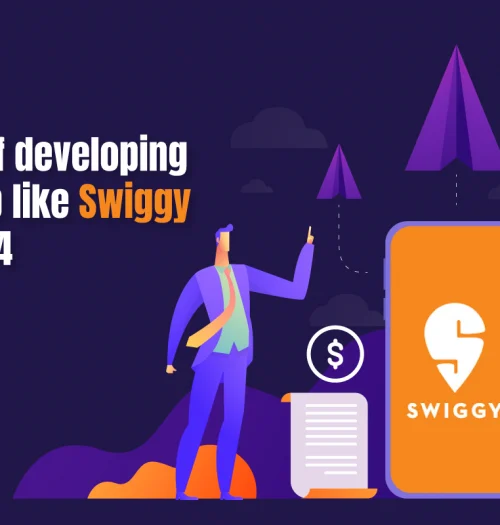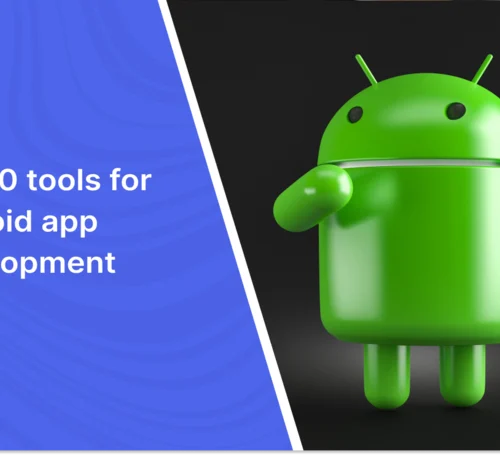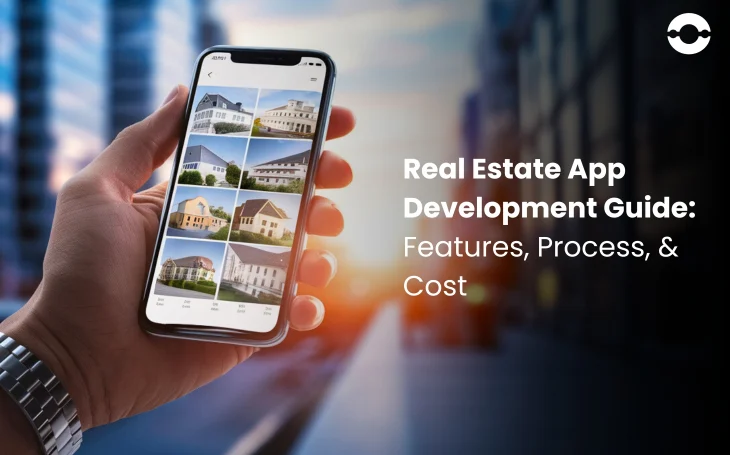
As a real estate business owner, it might seem daunting for you to spend countless hours generating quality leads and managing properties. This happens when you are not using technology to simplify your real estate operations.
Unlike other industries, technology is growing at an unprecedented rate and the real estate industry is no exception.
When demand for technology has increased manifold, you are still following the traditional process of listing properties in newspapers and magazines.
But, for that, you must have an online presence by creating a website or a mobile application. These online platforms become the FACE of your real estate business.
But if you are considering whether your target customers went online or not. A report indicates that 74% of homebuyers start their online research process for properties on smartphones and tablets.
That means to take your real estate business to the next level, investing in a real estate mobile application is a game changer for your business.
In this blog, we’ll explore the real estate app development process in detail and why you should invest in it.
Real Estate mobile app development market statistics
The demand for mobile applications has been increasing in real estate and let’s see what numbers say about this.
- The market size for the real estate market will reach $637.80 trillion by 2024.
- According to the National Association of REALTORS, 97% of customers browse different websites for searching properties. Out of that, 50% of home buyers conduct their online searches on Desktop and the rest search for properties using mobile devices.
- The global market revenue of real estate is expected to increase by 14.5 trillion dollars by 2030. This is because of increasing population growth and an improved standard of living enabling people to look for office and home space options.
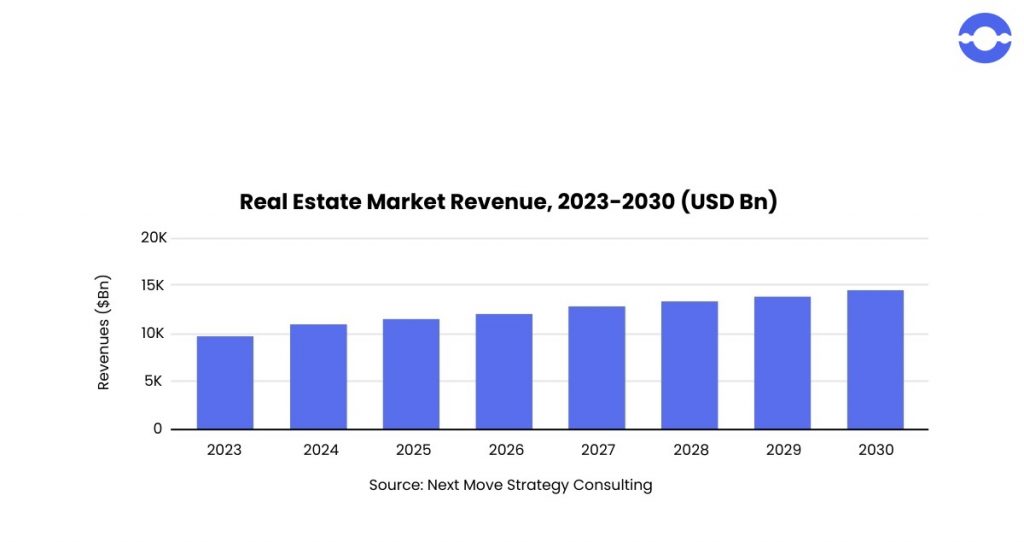
- Asia Pacific market has the largest real estate market share. That’s because of rapid urbanization and people are shifting to this market for more job opportunities.
The above-mentioned statistics highlight the growing popularity of the global real estate market. Thus, real estate businesses can reach new heights by marking a digital footprint in the industry.
Why should real estate businesses invest in mobile apps?
Unlike other industries like travel, healthcare, or dating, mobile apps have now become the leading frontier in the real estate sector as well. Mobile apps connect prospective buyers with homeowners.
It’s a platform enabling buyers, sellers, or tenants to decide or gather information about the property on the go.
People these days are so busy and impatient that they need a platform for making a quick deal.
Even studies indicate that in the US, nearly 80% of property buyers use mobile apps. While 70% of them prefer using real estate mobile apps for finding property agents.
Here are a few reasons why investing in real estate mobile applications is a game changer for your business-
- A real estate mobile app acts as a 24*7 communication channel to help people connect with realtors on the go. Users can access your services with a few clicks, and this enhances customer experience.
- Agents can bring customers down the funnel by sending push notifications that include current offers or discounts. Thus, the entire sales process becomes easy as they don’t have to sound pushy or salesy all the time.
- A personalized app builds your brand identity and attracts more customers.
- Through a mobile app, you can quickly expand your business and reach global customers anytime and anywhere.
- You can provide immersive experiences to property buyers with the help of AR/VR.

For Instance – You can provide interactive virtual tours and give them a live demo of how the property looks like. This reduces the in-person visits and provides convenience for buyers.
What are the various types of Real estate mobile applications?
Every app serves a different purpose and depending on the target audience, there are various types of real estate mobile apps. Before you begin your app development process, make sure you know which type of app you want to create as per your business needs.
1. Property marketplace apps
It is a type of real estate mobile app that provides a single platform for connecting realtors and property managers with buyers. These apps have 3 panels, and their function is to perform various operations.
Realtors can showcase details and images of their properties on the app. Customers can contact realtors to buy, sell, or rent properties. The third panel is for administrators who earn commissions from both realtors and users.
2. Mortgage and financing apps
Through these apps, users receive funding or some sort of financial support from various financial institutions. Users can filter through various loan options depending on their business needs such as the type of loan, the amount they’re looking for, and choose the specific lender.
3. Real estate agents app
The real estate agent app does all the heavy lifting on the agent’s side. This app can be used for various purposes such as communicating with clients, managing documents, simplifying the sales or listing process, scheduling appointments, or tracking their commission over time.
4. Property valuation apps
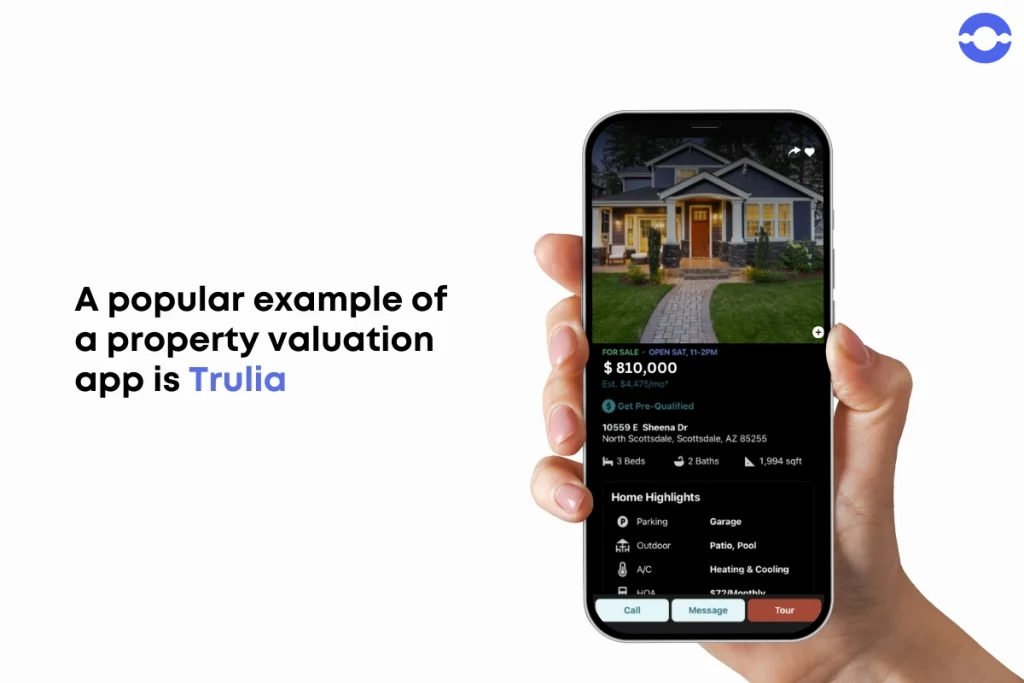
Gone are the times when real estate agents and investors need to manually find the property valuation.
These apps use algorithms such as AI and ML models to find the worth of property by considering various factors such as the location of the property, surrounding infrastructure, size of the property, prices of related properties in the same location, etc.
As it provides accurate valuations, buyers, sellers, lenders, and investors can know the true worth of a property. These apps go through various online sources and hundreds and thousands of data points to provide a true value of property.
A popular example of a property valuation app is Trulia. It calculates the estimated value of a property based on millions of data points and gathers information from online sources. Thus, buyers, sellers, realtors, or investors can make quick decisions in the future.
5. Property management apps
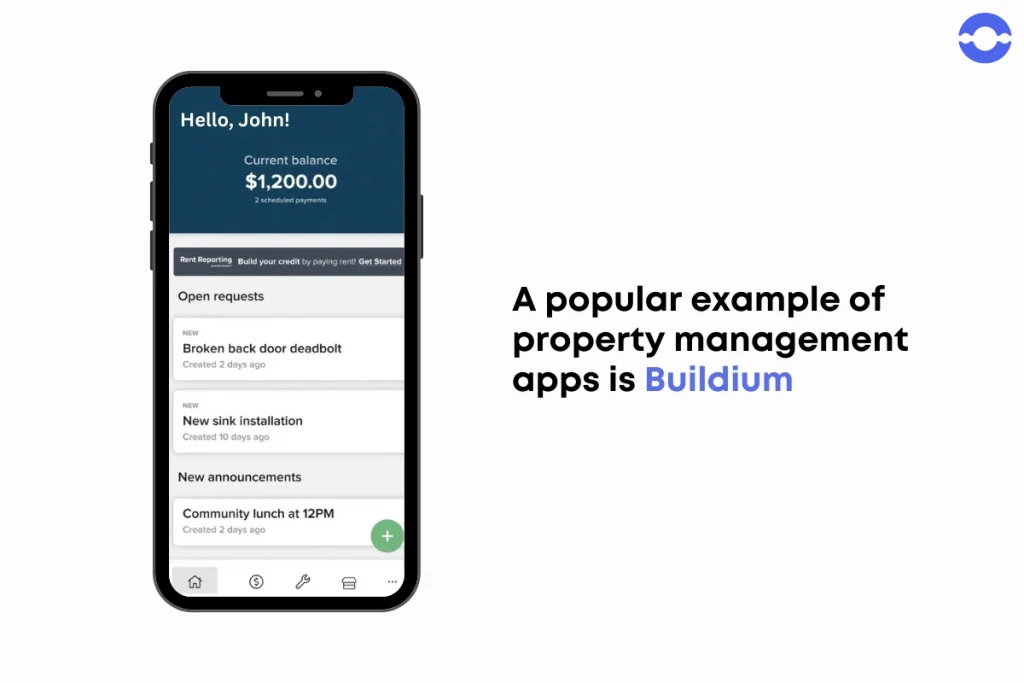
This app is exclusively designed for property managers and landlords. Users can manage multiple properties on the fly, see which properties are rented, store the documents, track rent, or allow the tenant to pay for rent or purchase of property.
A popular example of this type of real estate mobile app is Buildium. It’s a property management app for realtors and property managers for rent collection and guides them on how to manage property that gives them more money.
Revenue Models for Real Estate Mobile Apps
Building a Real estate app sounds easy but making it more profitable seems like a NIGHTMARE.
Real estate businesses can make money from apps by adopting various monetization techniques such as in-app advertising, subscription, freemium model, and commission-based.
Let’s talk about them in detail about various monetization options you can adopt depending on your business needs.
1. Subscription model
In this real estate app monetization strategy, you charge recurring fees from users. The app is available for free download.
But users can access the premium features by paying a certain fee and these include advanced search filters, sending a direct message to agents, and notifying users about new listings available on the app or they can do ad-free browsing.
You can offer various subscription plans to users either monthly, quarterly, or annually. This way, the app owner can earn recurring amount of revenue.
2. Premium listing
Using this app monetization model, property owners or real estate agents pay an extra amount for showing featured listings on the home page of an app.
This feature is advantageous for agents who want to make quick sales and get maximum exposure on the property. Thus, increased exposure gives you more buyers, and hence more sales result in increased revenue for the business.
The property owner can showcase these featured listings until they have access to a paid plan.
3. Advertising model
Another way to monetize the real estate app is by selling advertising space online to realtors, agents, property owners, investors, or landlords.
The app owners can earn a significant amount of revenue based on user interactions such as clicks or impressions.
4. Commission based
You can monetize the real estate mobile app through a commission-based approach. You can earn a certain amount of commission for selling successful rental/property.
Thus, it brings massive revenue for the app owners as for each successful property transaction, they earn a certain amount of commission upon the finalization of the deal.
Benefits of creating a real estate mobile application
Here are a few advantages that real estate companies get by developing mobile apps-
1. Direct customer interaction
Creating a real estate mobile application establishes a direct one-on-one connection between property buyers and realtors. Many online buyers aren’t interested in connecting with an agent to find a realtor.
These days, consumers spend most of their time on smartphones. Unlike searching for clothes or groceries, they prefer searching for properties online using mobile devices.
As the customers have become more tech-savvy, so do the real estate companies. They should invest in mobile apps to connect with them and keep the conversation going on.
2. Widen your market reach
Nearly 4.88 billion own a smartphone and it can be your potential market too. Research studies indicate that nearly 1 in 4 people conduct a mobile search when they seek new homes.
That’s why it’s super important for dealers or agents to display their properties online because a lot of people rely on real estate apps to find properties.
Thus, property owners/dealers can help you increase your market reach and connect with potential buyers.
3. Simplify the property browsing experience
A real estate mobile app with an intuitive user experience helps customers to browse properties on the fly.
Buyers can find a suitable property by narrowing down their search results based on various factors such as size of property, location, age of property, and number of rooms.
Thus, buyers can complete their house-hunting process through a mobile app available at their fingertips.
4. Skyrocket your sales
A real estate app increases your sales by bridging the gap between realtors and buyers. It provides enough information for the buyers to help them make a faster purchase.
It saves their time as they can view the details of the property anytime and anywhere.
If they are satisfied with the property details, they can contact the property owner to visit a site physically and lock the deal.
Key Features of a Real Estate Mobile App
The primary objective behind creating a real estate app is to encourage users to smoothen their property-related transactions.
That’s possible when you make your app future-ready by incorporating the latest trends in it.
You don’t want to overwhelm users by adding too many features but ensure that basic features and functionalities that users expect should be included in your application.
Here are the MUST-HAVE features you should include to ace your real estate app development game –
1. User onboarding
The first step that makes your app successful is a smooth onboarding process.
The easier it is to sign up on an app, the more time users are likely to spend on it. Whenever a user lands on your app, the signup/registration process should be simple.
There are 3 ways through which users can sign up for a real estate app-
- Social media verification
- E-mail verification
- Verification through phone number
2. User profile
As a mobile app development company for real estate, we ensure that apps should have a user profile feature.
There are different user profiles for agents, buyers, and property owners.
If the buyer would have to create a user profile, he would choose that option. The buyer’s profile will be different from the agent’s profile.
A buyer profile for instance allows buyers to access and view the specific listings and save their favorite ones.
An agent’s profile shows the history of how many buyers are interested in the property, the list of properties he owns, etc.
3. Database and listings
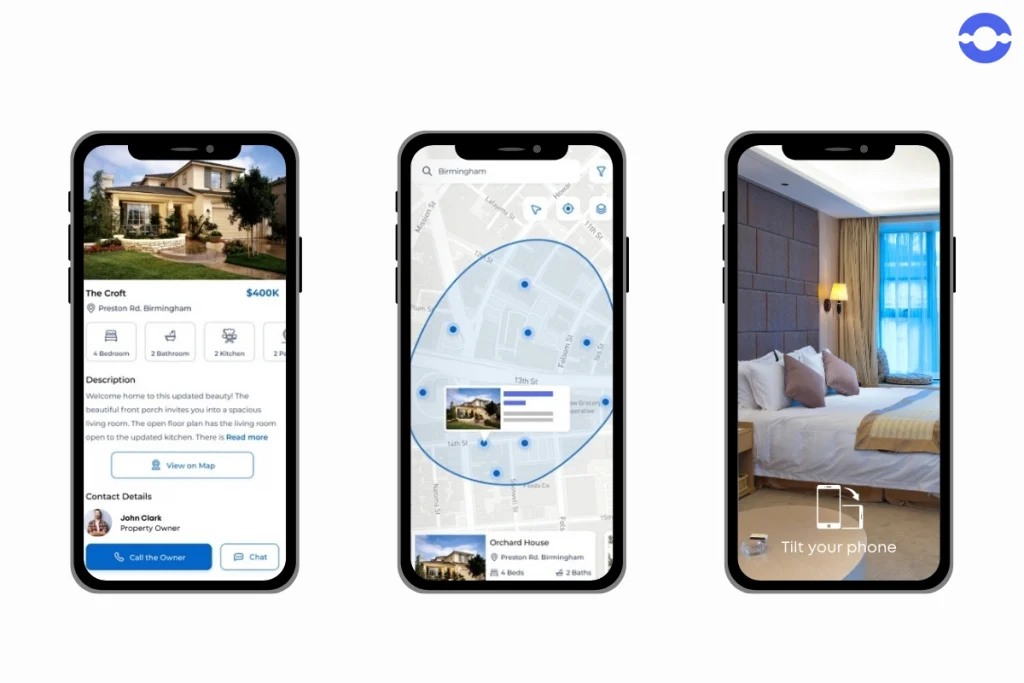
It’s one of the basic features of creating a real estate app.
A listing feature allows users who want to add their properties without any hassle. Users can add a property and mention a few details such as type of property, pricing, and status.
An app with an extensive database attracts more users. As more users join the platform, there will be an increase in operations. That’s why server/database is there to handle loads of users.
4. Search filter
In buying or renting a house, adding an advanced search or filter option is a MUST.
Advanced search filter functionality enables users to find the best property that matches their needs. Buyers can narrow down their property-related searches based on property size, square footage, price of property, etc.
5. Price calculator
While developing a mobile app for real estate companies, adding a price calculator feature is worth it.
This feature calculates the price of property and provides other loan-related information such as taxes, first payment, EMIs, loan duration, interest rate on loans, and loan amount.
Thus, the buyer will make an informed decision when deciding to invest in a property.
6. Direct messaging
Calling or messaging is another important feature to be included in a real estate app.
Though the app provides requisite information to property buyers, a voice or video conversation is important for pushing the customers down the funnel.
Buyers can interact with property owners or agents through any of these modes such as chat online, audio call, video call, book a consultation, etc.
7. Push notifications
Push notifications are an effective way to retain users on the app.
Secondly, when there are changes in property prices or when you want to introduce a new property, you can send a reminder message to customers about the new or latest properties or their prices.
But the messages should be highly personalized, not salesy or pushy.
Advanced feature in real estate app:
8. 3D virtual tour
A virtual tour of a property is an advanced feature you can add to your app. These tours provide an immersive experience for users before they end up buying a property.
Studies indicate that 77% of real estate agents say that virtual tours of property give them more visibility on listings and make their property stand out. Clients can immerse themselves and feel as if they are in their real room.
Steps involved in developing a mobile application for real estate business
Once you are clear about the fundamentals of a real estate app, here’s the step-by-step guide we’ve compiled for you on creating a real estate app-
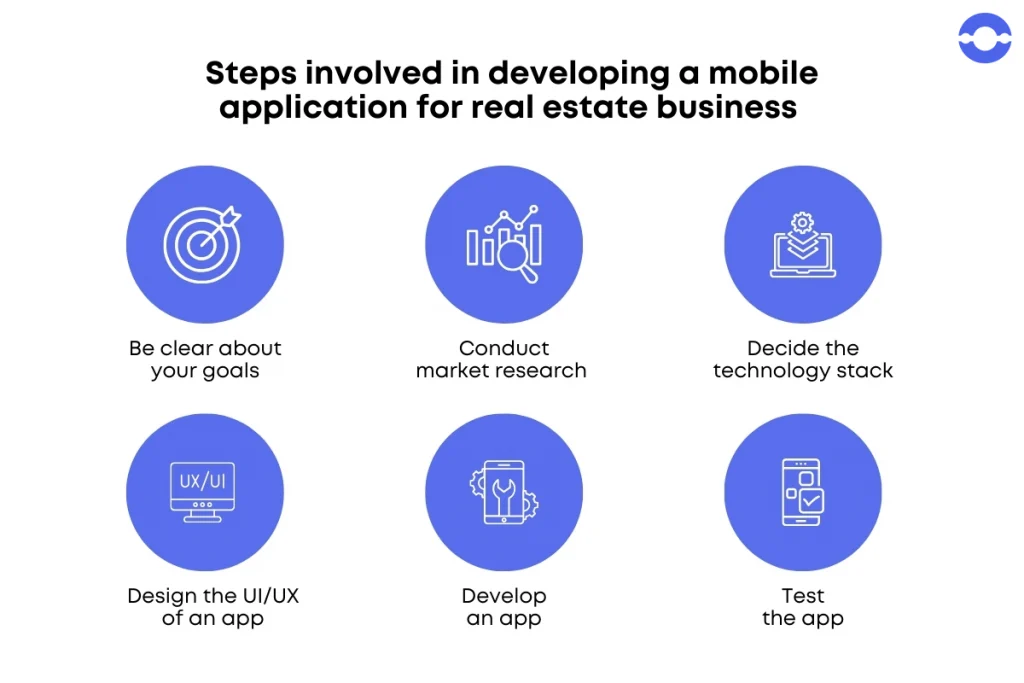
1. Be clear about your goals
In this step, you need to decide what type of real estate app you want to build, identify your project goals, and who is your target audience.
Ask yourself whether you want to build an app for real estate companies, a property management app, or a house-hunting app.
Upon deciding on the app, you will create a checklist of features you want to include. Therefore, the app’s goal should be clear from the start.
2. Conduct market research
The next step involves conducting market research for your mobile app idea. Here, you would perform competitor analysis, find their unique selling points (USP), and find out what things they are lacking in their app.
Try using your competitor app and see what features you like the most, how is the UI/UX of that app, and what makes you tick online such as enticing offers or support you get.
Find out what are the shortcomings in their app, work on those things, and make your app stand out.
You can talk to landlords or agents in your area and see what features or functionalities they expect or what challenges are they facing.
3. Decide the technology stack
The third step involved in creating a real estate mobile application is deciding on a tech stack.
You will hire dedicated developers with expertise in real estate and ask them to design the front-end and back-end architecture for the mobile app.
The tech stack involves using programming language, web server, integrated development environment (IDE), backend server integration, UI development, testing and debugging, etc.
4. Design the UI/UX of an app
Now, the UI/UX designers decide the look and feel of your app. As an app development company, we think of how users will interact with the app and think of scenarios of how users navigate through the app.
A good UI/UX design is important for a mobile app as it creates a positive impression, communicates your brand vision, and drives more revenue for your business.
5. Develop an app
Now, the app developers will write the code for the app and make sure to collaborate with the real estate mobile app development company.
Before launching the final version of the app, start with MVP to get user feedback. Your focus should be on adding basic yet essential features you can’t miss.
Once you know what users think about the app, fine-tune the app and launch the final app.
6. Test the app
Once the app is fully developed and available on the Play Store or app store, the next step is to conduct app testing. Testing of the app is super important to ensure that the app remains up-to-date and works flawlessly.
What Mistakes to Avoid While Building a Real Estate App?
If users download your mobile app and feel annoyed, then you won’t experience an increase in sales. That’s because you made a few mistakes in the app development.
1.No market research
Generally, businesses create apps by assuming what the target audience thinks. However, such preconceived notions won’t solve your target audience’s problems.
Being in the app development industry for years, we perform overall market research by analyzing existing real estate apps in the industry and figuring out what their weaknesses are by talking to customers.
2. Bad UI/UX
Another mistake to avoid in real estate app development is creating a bad UI/UX. An overcomplicated user interface overwhelms your users.
Instead, use a minimalist design and your app should have an easy-to-use interface.
You should think from the user’s perspective as to how the users will feel after using the app and how seamless navigation the navigation should be. Try using the hamburger menu so that the user can navigate between various sections.
3. Lack of quality media files
Suppose you develop a mobile app, and you notice that people are not engaging with your listings.
That’s because you displayed properties, but you either used no media file or low-quality visuals. People like to engage with apps that highlight the benefits of that property.
You can make your real estate app stand out by using a library of photos and videos.
By showcasing video tours of property or panoramic images, you can surely get the audience’s attention.
4. No personalization
Who doesn’t love customized apps? If the real estate app doesn’t give a personalized feel to the user, they won’t come back to the app.
Users love making transactions related to buying, selling, or leasing the property when the app has personalized features such as recalling the user’s previous search or making suggestions as per the user’s preferences.
Also Read: Top Use Cases for AR VR in Real Estate
Technology Required to Develop Real Estate Mobile App
Technology forms the foundation of app development.
Here are some of the technologies that our app developers use –
| Technology | Use cases | |
| 1. Frontend framework | HTML, CSS, JavaScript | You can use this tech stack to create app interfaces with which the user interacts. |
| 2. Backend technologies | Google Cloud Platform, Amazon web services or Microsoft Azure | These are the backend technologies for developing real estate apps. |
| 3. Database technology | MySQL/PostgreSQL, MongoDB | These are the relational databases used for managing the growing listings. |
| 5. Cloud services | RESTful or GraphQL API | Facilitates seamless data transfer. |
| 6. Infrastructure | Google Cloud platform, Amazon web services or Microsoft Azure | Online data storage. |
| 7. Testing and debugging | Kubernetes and Docker | Hosting the application. |
| You can use this tech stack to create app interfaces with which the user interacts. | Android emulator, Espresso, XCtest | Testing the application. |
Cost of Developing a Real Estate Mobile App
The average cost of building a simple real estate app having basic features and functionalities ranges between $25,000 to $40,000.
While the cost of creating an advanced app costs around $65,000.
But this isn’t just a fixed cost as it varies depending on other factors such as –
- Location of the development team
- Whether the app is built for a single platform or cross-platform
- How simple or complex an application you want
For instance – An app with basic functionalities is cost-effective as compared to an app having advanced features such as providing an AR/VR tour or AI-based recommendations.
How BigOhTech Can Help You Develop Your Real Estate Mobile Application?
The real estate app development industry has become highly competitive and to yield a greater return in the future, you need to create a visually appealing app.
As the number of real estate companies is increasing, you need to create an app that holds people’s attention and helps you close the maximum deals.
That’s only possible when you collaborate with an app development agency that has years of experience in crafting apps, provides round-the-clock support, and offers frictionless user experience.
You have an app idea; we have a dedicated development team. You know the customer problems; we know how to make your app rock.
As a real estate app development company, we combine our years of expertise in creating impactful digital solutions (real estate investment apps, property listing apps, real estate agent apps) that revolutionize your property business.
Just tell us your business requirements and our app development team will get in touch with you.
Related Post
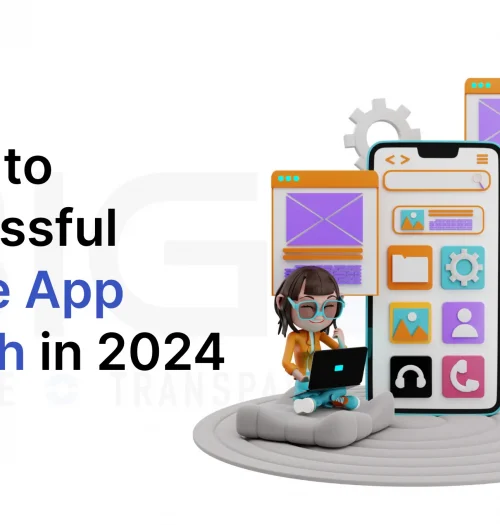
Guide to Successful
Mobile applications are complex software that demands technical experience and...



